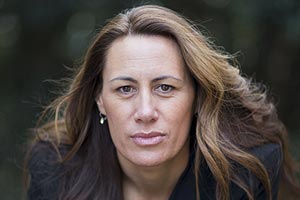
TV presenter Jenny-May Coffin has spoken of her emotional decision to embrace te reo after not understanding Maori phrases she spoke on air.
With Maori Language Week starting tomorrow, the former Silver Ferns vice-captain has told of the “embarrassment” she felt when viewers of Maori Television show CODE tried to converse with her in te reo Maori.
For nine years Coffin has co-hosted the weekly show, in which she and fellow hosts Glen Osborne and Wairangi Koopu speak in Maori, as well as English.
But unlike her CODE co-stars, until last year Coffin didn’t understand some of the phrases she was reading from an autocue.
“Since the beginning I have always felt like a fraud because here I was speaking Maori, and those who can speak Maori knew straight away when I was reading the autocue because the intonation wasn’t in the right places,” Coffin told Fairfax Media.
“I had been caught out on several occasions when people came up to me and started speaking Maori. They thought because I spoke it on the television, I must be a fluent speaker.
“I couldn’t even begin to tell you the embarrassment I felt at those times.”
Before Coffin started with Maori TV, her father, Waka, spoke to her about the potential pitfalls of talking on air in te reo, when she didn’t necessarily understand what she was saying.
“My father said to me right from day one, ‘Jenny-May you cannot go on that channel and not speak your language’,” she said.
“I just dismissed my father, ‘Yeah, whatever dad … it is just my day job, I just read the autocue, that is what I do, it is just part of my job’. [His] words obviously took on greater significance once people started talking to me in Maori and I couldn’t answer them.”
But those days are now a thing of the past, with Coffin into her second year of studying te reo fulltime.
Early last year she enrolled at Auckland’s Te Wananga Takiura, studying from 9am-3pm, five days a week.
This year she has studied four days a week at fellow Auckland institute, Te Wananga O Aotearoa.
Coffin has been able to fit the studies around her broadcasting commitments, which along with CODE, include at least two days a week reading the sports news on TVNZ.
She has been able to share the learning experience with her father, who had previously also enrolled to study the Maori language.
“Even though both his parents spoke the language, my grandfather grew up in that era where they believed in order to get anywhere in this life you had to conform to what everyone else was doing, which was speaking English,” Coffin said.
Ad Feedback
“Therefore he stopped speaking Maori to his children; to my dad, his brothers and sister.”
Jenny-May’s exposure to Maori as a child was restricted to school studies and involvement in school culture groups.
But the 39-year-old said: “I never understood any of it. I learnt it up to about third form in school and stopped doing it, essentially because it got really hard.”
Coffin is yet to commit to a third year of fulltime Maori studies, saying it depended on her work commitments in 2014.
But she described the past two years since gaining a better grasp of te reo as “pretty powerful”.
The highlight was the fact she could now have a conversation in Maori with her father.
She added: “There have been so many great moments [like] the moment when I went onto a marae and I understood what was being said … I started to cry because I had been shut out of this world, which I knew I belonged in, for most of my life.
“Now all of a sudden I was allowed entry, I became a member as such. That was a point partway through last year. I didn’t understand everything, but I understood the guts of what was being said.”
On a lighter note, being able to understand and speak te reo meant she was also able to cotton on to when Osborne and Koopu – both fluent in Maori – tried to make fun of her on air. “That is one of the other positives,” Coffin said.
On the eve of Maori Language Week, the former netball star (26 games for the Silver Ferns from 1997-2002, two Commonwealth Games silver medals and a World Championship silver medal) urged New Zealanders thinking about embracing te reo Maori to take the plunge.
She said learning a new language involved “putting yourself on the line” in a room full of strangers.
But not only had Coffin learned how to speak and understand Maori, she had also learnt an immeasurable amount about herself. “It is the hardest thing I have ever done, but it is the most rewarding thing I have ever done,” she said.
“I know what it is like to be on the outside and I can not express enough how amazing it is to be a part of the world you know you belong to. It is tough mentally, tough to find the time to be able to learn the language, but the rewards far outweigh the negatives.”
–